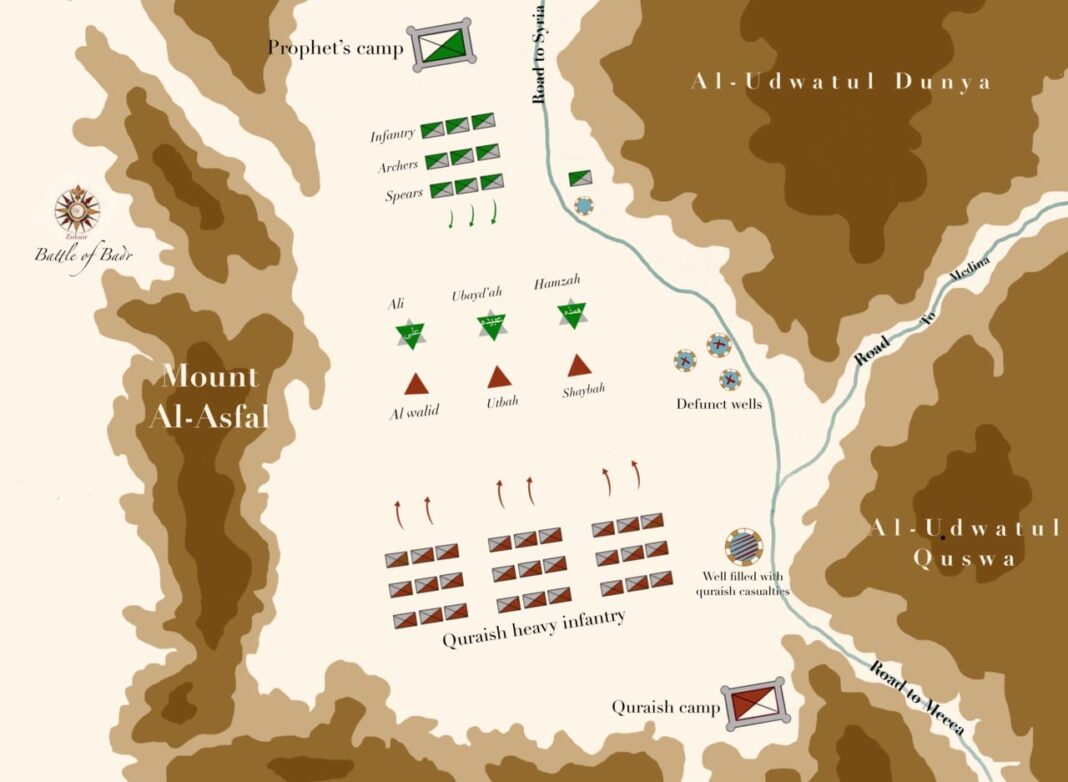The Battle of Badr, fought on the 17th of Ramadan in the second year of the Islamic calendar, holds immense significance for Muslims around the world. This clash between the fledgling Muslim community of Medina and the powerful Quraysh tribe of Mecca marked a crucial turning point in the history of Islam. It not only secured a decisive victory for the Muslims but also solidified their faith and paved the way for the establishment of Islam as a formidable force. This article delves into the details of the Battle of Badr, exploring its historical context, key events, and its profound implications for the development of Islam.
ﷺ = Sallallahu Alaihi Wasallam (Peace Be Upon Him)
Table of contents
Introduction
The Battle of Badr is a pivotal event that shaped the course of Islamic history. It took place in the Arabian Peninsula during a time of heightened tensions between the Muslims of Medina and the Quraysh of Mecca. This battle would test the resolve, strength, and faith of the Muslim community, led by the Prophet Muhammad (ﷺ). Understanding the historical context surrounding this encounter provides a deeper appreciation of its significance.
Preparations for Battle
Before the Battle of Badr, the Prophet Muhammad (ﷺ) carefully strategized to defend the Muslim community against the Quraysh’s aggression. Despite the Muslims being outnumbered and lacking in resources, the Prophet’s tactical considerations, such as selecting a favorable location and ensuring unity within the Muslim ranks, played a crucial role in their preparations. The composition and strengths of the Muslim army, although modest, showcased their determination to defend their faith.
The Quraysh Response
The Quraysh, a powerful tribe from Mecca, responded to the Muslim threat by assembling a large and well-equipped army. Led by Abu Sufyan, they sought to crush the Muslim community and halt the growing influence of Islam. Abu Sufyan’s efforts to gather allies against the Muslims highlighted the seriousness with which the Quraysh regarded the emerging Islamic community.
The Clash at Badr
The Battle of Badr began with initial skirmishes and individual combats between warriors from both sides. The Prophet Muhammad (ﷺ)’s strategic positioning of the Muslim army played a crucial role in gaining an advantage over the Quraysh. Despite being outnumbered, the Muslims demonstrated remarkable courage and resilience. Divine support and supernatural intervention further bolstered the morale of the Muslim troops.
Key Events and Turning Points
Several key events and turning points shaped the outcome of the Battle of Badr. Notably, the duel between three Muslim champions, including the Prophet Muhammad (ﷺ), and three Quraysh champions displayed the extraordinary bravery of the Muslims. The intervention of the Muslim archers, who obeyed the Prophet’s orders to hold their positions, proved pivotal in securing victory. The Muslims’ unwavering faith and determination had a profound psychological impact on their opponents.
Victory and Its Aftermath
Despite being outnumbered, the Muslims achieved a decisive victory at the Battle of Badr. The Quraysh suffered significant losses, including the capture of several key leaders. The spoils of war, including prisoners of war and valuable possessions, were distributed among the Muslims. This victory elevated the status of the Muslim community and established them as a force to be reckoned with in the Arabian Peninsula.
Legacy and Significance
The Battle of Badr left a lasting legacy in Islamic history. It solidified the faith of the Muslims and strengthened their belief in divine support. The victory at Badr marked a turning point in the struggle between the Muslims and the Quraysh, enabling the consolidation of Islamic authority and the subsequent growth of the Muslim community. The lessons learned from Badr, such as the importance of unity, strategic planning, and unwavering faith, continue to resonate with Muslims today.
Contemporary Perspectives on the Battle of Badr
Scholars and historians have provided various perspectives on the Battle of Badr based on historical accounts and interpretations. Analyzing different narratives helps us gain a comprehensive understanding of the battle and its significance within the context of contemporary Islamic discourse. The relevance of the Battle of Badr extends beyond its historical context, offering valuable lessons and insights for Muslims navigating modern challenges.
In conclusion, the Battle of Badr stands as a defining moment in Islamic history. It showcased the strength of faith, strategic acumen, and resilience of the Muslim community led by the Prophet Muhammad (ﷺ). This victory not only secured the survival of the early Muslim community but also laid the foundation for the spread and establishment of Islam. The Battle of Badr continues to inspire Muslims worldwide, serving as a symbol of hope, courage, and unwavering belief in the face of adversity.



 For all latest articles, follow on Google News
For all latest articles, follow on Google News